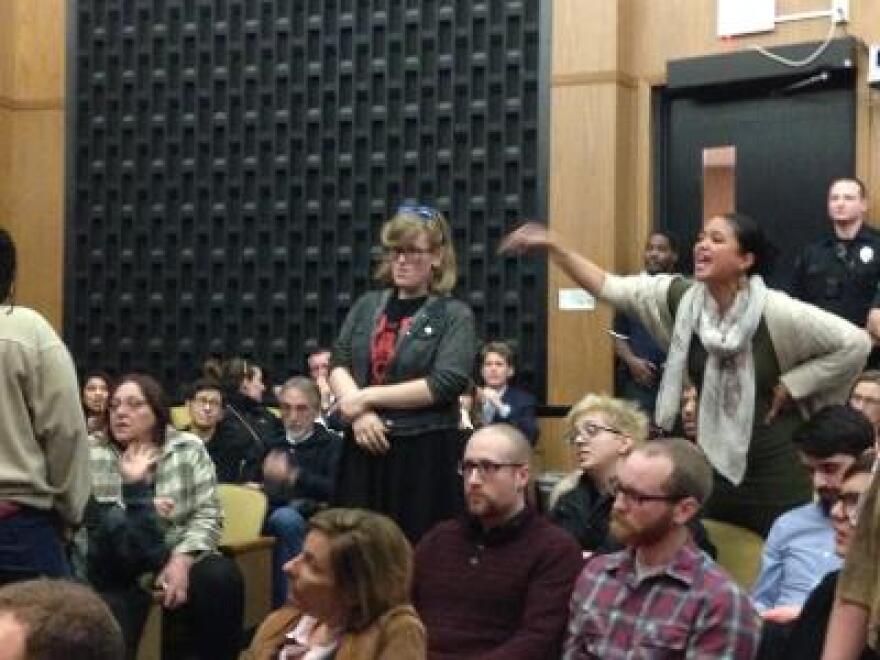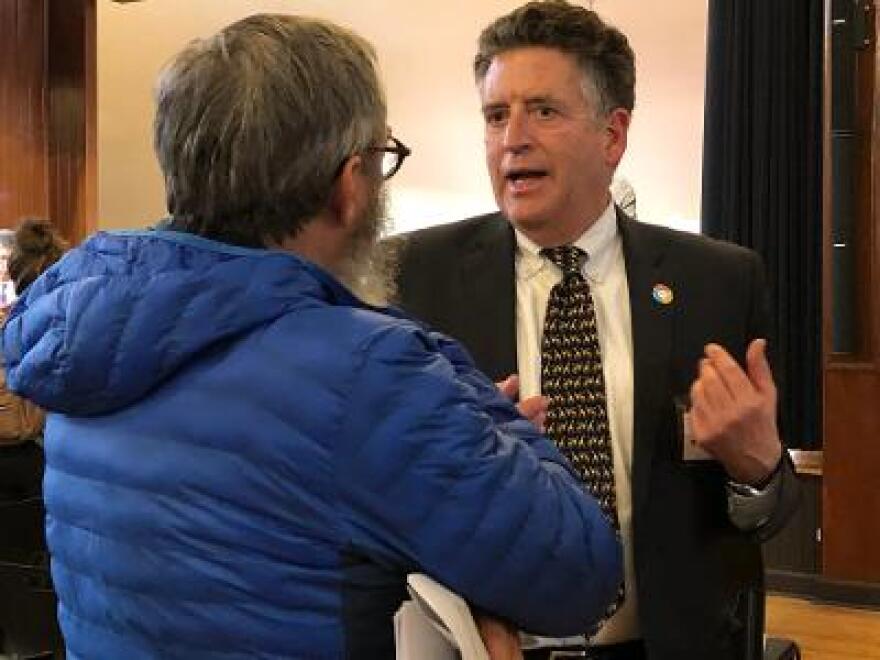In the aftermath of Unite the Right, some Charlottesville residents were furious. They felt the city and its police force had failed to protect them, and their anger was evident at city council meetings where elected officials like Kristin Szakos presided over public comment. It was pandemonium when Jason Kessler, who helped organize the rally, told council, " “I’m here for white people, because they need civil rights right now."
Members of the public booed loudly, and Szakos warned, "Mr. Kessler you are getting dangerously close to hate speech, which we do not allow."
Critics from the Black community also took their turn, protesting a vote to rename Lee Park. Council favored calling it Emancipation Park, but resident Mary Carey told Szakos that African-Americans were not really emancipated and circulated a petition demanding another change to the name. “Charlottesville needs to take that name of that park away. I got a couple of judges that are going to look at this petition after the holidays, and they will decide," she said. When Szakos advised her time was up, "Carey replied, "Your time is up. Your time is up too!”

For months, people showed up to shout during council meetings that lasted for hours. Mayor Mike Signer says it was impossible to get basic things done, and he claims voices of moderation were discouraged from taking part in meetings.
“People in the community who are just kind of interested in the work that city council does, they’re not going to come to the meetings, because they’re being attacked, they’re too loud, they go on too long," he explains.

Former Mayor David Toscano, who served 12 years on the board beginning in 1990, says social media made matters worse. “Facebook, Twitter, Tik Tok did not exist when I was on the city council, and I think that did have an effect of moderating things a little bit more, because not everything you said right away was out there for people to criticize in real time.”
Some thought the situation might improve if council elected a mayor who was Black. Member Wes Bellamy proposed a newcomer – Nikuyah Walker – be given the job. “If we truly believe that we’re about equity, and I do believe that optics matter, then we need to vote for Miss Walker and let’s start changing the page," he told a cheering crowd at city hall.
But Walker quickly sparked controversy, going public with information discussed during closed-door meetings and using her city credit card to make a donation to a non-profit group after its director spoke to council. She also bought gift cards for people who had served on panels advising the city.
“Community members come up with solutions that people who are making 90, 100, $200,000 can’t come up with, and I give them $25 gift cards for every hour that they spend helping us heal this community,” she explained.
Walker learned she was under investigation by the local prosecutor who eventually announced he would not bring charges, but the mayor lashed out at her colleagues for allegedly reporting the possible misuse of public funds. “If you thought I was doing something wrong, why didn’t you just tell me? You might not want to hear what I have to say. I’m persistent. You might want me to shut up, but I’m not aggressive. None of them can ever say that I’ve yelled or cursed at them. Heather can say it, and Lloyd, Mike Signer – there are a few people who can say that.”
In our next report, we’ll look at why Charlottesville has long had trouble governing itself and why it has struggled to hire a manager.
PART TWO
This week Charlottesville’s City Council holds its first meeting of the new year, and residents are hoping for a fresh start. Sandy Hausman reports on why the city has lost five managers in the last four years and is now opting to hire an outside company to oversee its day-do-day affairs.

The arrival of neo-Nazis and other white supremacists in Charlottesville left the city feeling violated. People were angry that their elected officials had not stopped organizers from meeting here, and they were furious with police who failed to protect counter-protesters. Dozens showed up to let city council and Mayor Michael Signer know how they felt.

A lawyer and biographer of James Madison, Signer tried to calm the crowd. “This kind of yelling -- we’re having a discussion up here," he told the crowd. "I Just wanted to say that it’s regrettable. This gentleman over here..."
" I’m not a gentleman, F______," shouted a member of the audience.
"Shame on you!” shouted another.
Even before he took office, Signer says, city council was known as a bit of a circus. “Very progressive college towns that are pinpricks of blue in a sea of red and tend to have a very intense idea of activism and a mission-driven sense, and I think you probably see that in a lot of college towns around the South.”
And former Mayor David Toscano says the home of Thomas Jefferson was big on public participation in government. People would debate issues long after other cities would reach an agreement and move on. “We fancy ourselves as an intellectual, cosmopolitan town in which everybody ought to have their say and then have their say again. We’d have a study, and then we would talk, and then we would have another study, and then we would talk, and then we would delay a decision, and things never got done.”
Signer says he and other members of council were trying to change that pattern – to push for results during their term in office, and he claims they were making progress when the radical right came to town. “It took the tensions that already were present, and it magnified them. Just like hurricanes – you know Hurricane Katrina showed the weaknesses of the government posturing in New Orleans and the Bush Administration. I think August 12th showed the weaknesses here.”

Mayor Nikuyah Walker pushed to do things differently -- to dismantle an establishment she thought was racist. When the city was searching for a new manager, for example, she insisted three finalists go on stage for a Q&A with the community.
Signer says people looking for new jobs don’t often want that known by their current employer, and the city’s conduct meant search firms were reluctant to work with Charlottesville. “Most city managers come through search fims," he explains. "They have to visit and spend time with you, and so if they think that all that work could go up in smoke, they won’t work with the city.”
One company reportedly told members of council that they should wait until after the next election to search. By then, the controversial mayor might be gone. Nikuyah Walker was outraged and shared her distress with the public. “They’re trying to get someone in here who can ignore you, who will ignore me, and they are using their positions to influence decisions," she said. "They don’t care how much anyone yells or screams. I think that is one of the most devastating things of all of this, is as liberal and progressive as we call ourselves, you revert back to what white people have done forever and say, ‘You know what? We’ll make the decision that is best for us.’”
In fact, Walker decided not to seek re-election, and this week two new members replaced her and Heather Hill.
PART THREE
A consultant who was asked to work with Charlottesville in its search for a new manager walked away from the job, saying the city’s government was the most dysfunctional he had ever seen. Some have blamed former mayor Nikuyah Walker, whose confrontational style made headlines. Now, she’s gone and two new candidates are on city council.

If rebuilding is the mission, Brian Pinkston could be the man. The newly elected member of Charlotteville City Council studied at a seminary and has a PhD in philosophy , but he also has an engineering degree from Georgia Tech and oversees major construction, repairs and renovations at the University of Virginia.
“The work that I’ve done, the way that I’ve made my living over the last 30 years involves being decisive.”
That’s not to say he won’t be listening to citizen concerns – something he did a lot of during the campaign.
“I knocked on 37-hundred doors. If I’d been able to knock on another couple of hundred I think I would have won, but I ran out of time. You meet a person in their house or the neighborhood where they are, it creates a level of empathy and a framework to understand why a person may be as angry as they are. If my kid, for instance, had been pulled over multiple times because of the color of his skin, I would be pretty furious too.”
And like one of his predecessors, Nikuyah Walker, he’s anxious to attack systemic racism, to provide affordable housing and improve policing in the city.
“I am willing to put my time and effort and energy towards accomplishing the goals we’ve set for equity. We need to put money where our progressive mouth is.”

That said, it’s clear his tactics and behavior will be very different from Walker’s. The same can be said of the other newcomer to council. His name is Juandiego Ricardo Wade. “As far as I know, I am 100% African-American, but my father was taking a Spanish class in college at the time, and I hope he got an A,” he says.
Wade is the son of a minister and public school teacher who grew up in a big family where negotiation and compromise were key to survival. “Three boys and three girls," he explains. "I like to tell people we’re the Black Brady Bunch.”
He got a master’s degree in urban planning from UVA, is an administrator with Albemarle County and served on the city’s school board for 16 years. “When I got on the school board the graduation rate for our students of color was in the mid-60’s, and now it is in the high 90’s."
He says he’s ready to work toward similar success stories in the city and hopes council meetings will be boring. At the very least Pinkston says there will be a different tone at those bi-monthly gatherings. “There’s a lot of desire on each of our parts to close a chapter, turn the page and show what good, responsive governance could look like.”
Ironically, they’ll get some help in that vein from the pandemic. COVID has moved city council meetings to the Internet where a moderator keeps tight control over the public comment period, and those in virtual attendance are unable to interrupt with catcalls and obscenities.
Former council member Heather Hill adds that in spite of the noise at city hall, Charlotteville has a good and reliable staff which has gotten many things right. The removal of confederate monuments, for example, and management during the pandemic should be counted as success.
“A lot has been achieved, and too often we focus on what I call the Monday Night Lights when things kind of rile up in the public versus a lot of great work that our staff has led.”
And, in fairness, she says Charlottesville is a small town dealing with big city problems like affordable housing and effective policing.
“I think there are just so many things happening at the national level, and we are a microcosm of many of those things, but we have to remind ourselves we’re still a city of less than 50,000 people.”
In our final report, Randi Hagi explores the costs of chaos at city hall and how Cville will operate until it can hire a new manager.



